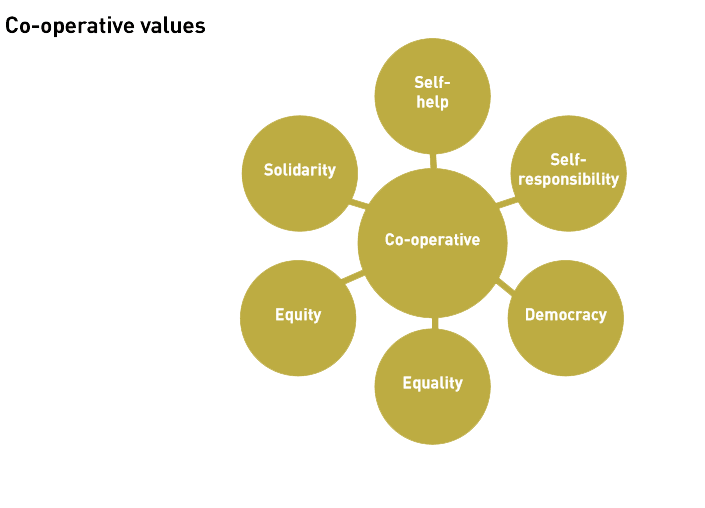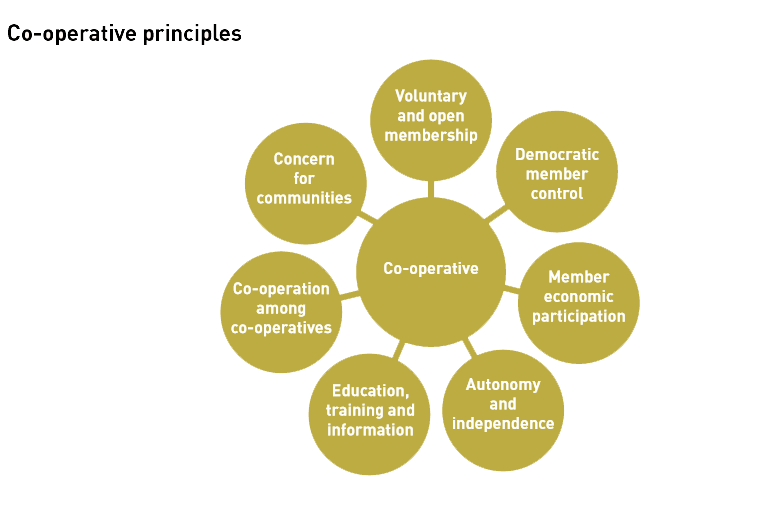PART ONE: UNDERSTANDING CO-OPERATIVES
Co-operative identity, values and principles
The International Co-operative Alliance (ICA) has members from more than 95 countries representing around a billion individual co-operative members. The ICA, a non-government, independent association, unites and serves co-operatives worldwide, and is accepted as the final authority for defining co-operatives and determining the principles on which co-operatives should be based.
Despite vast differences in cultures and practices across the world, the ICA identified the characteristics which describe the unique identity of co-operatives. The ICA sees these characteristics as “inherently practical principles, fashioned as much by generations of experience as by philosophical thought”. They are generally considered to be the standards for co-operatives.
Definition
A co-operative is an autonomous association of persons united voluntarily to meet their common economic, social, and cultural needs and aspirations through a jointly owned and democratically controlled enterprise.
Co-operative values
Co-operatives are based on the values of self-help, self-responsibility, democracy, equality, equity, and solidarity. In the tradition of their founders, co-operative members believe in the ethical values of honesty, openness, social responsibility and caring for others.
Co-operative principles
1. Voluntary and open membership
Co-operatives are voluntary organisations, open to all persons able to use their services and willing to accept the responsibilities of membership, without gender, social, racial, political or religious discrimination.
2. Democratic member control
Co-operatives are democratic organisations controlled by their members, who actively participate in setting their policies and making decisions. Men and women serving as elected representatives are accountable to the membership. In primary co-operatives members have equal voting rights (one member, one vote) and co-operatives at other levels are also organised in a democratic manner.
3. Member economic participation
Members contribute equitably to, and democratically control, the capital of their co-operative. At least part of that capital is usually the common property of the co-operative. Members usually receive limited compensation, if any, on capital subscribed as a condition of membership. Members allocate surpluses for any or all of the following purposes: developing the co-operative (possibly by setting up reserves, at least part of which would be indivisible), benefiting members in proportion to their transactions with the co-operative, and supporting other activities approved by the membership.
4. Autonomy and independence
Co-operatives are autonomous, self-help organisations controlled by their members. If they enter into agreements with other organisations, including governments, or raise capital from external sources, they do so on terms that ensure democratic control by their members and maintain their co-operative autonomy.
5. Education, training and information
Co-operatives provide education and training for their members, elected representatives, managers and employees so they can contribute effectively to the development of their cooperative. They inform the general public – particularly young people and opinion leaders – about the nature and benefits of co-operation.
6. Co-operation among co-operatives
Co-operatives work together through local, regional, national and international structures to serve their members more effectively and to strengthen the co-operative movement.
7. Concern for the community
Co-operatives work for the sustainable development of their communities through policies approved by their members.


